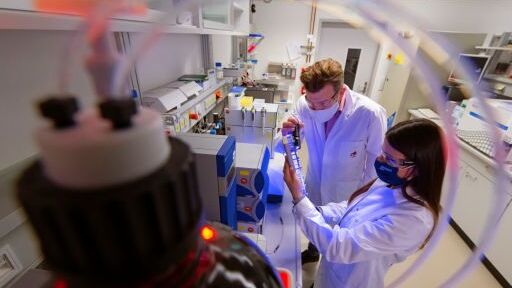
Published:
The design and discovery of new molecules and materials is slow. A major reason for that
is that our research approach often relies on trial-and-error and is bottlenecked by
information transfer: We would greatly benefit from having all information as well as
intuition of all chemists at our fingertips. Machine learning can help us democratize access
to this expert knowledge and help us navigate high-dimensional design spaces.
In our lab will develop data-driven strategies for designing materials that work in the real
world around three main research pillars: 1) Novel inductive biases (including “soft”
inductive biases via LLMs), 2) Human-in-the-loop active learning, and 3) Novel learning
paradigms. We will develop robust open-source software and also contribute to
international research data initiatives. The PostDoc position will have a focus on this
research data management aspect and the use of novel tools (such as LLMs) in this
context.
Due to their unique tunability (and the correspondingly large design space) and
functionality, we will focus on polymers, where we will closely collaborate with worldleading
experimental partners to validate our predictions and build novel modeling and
data frameworks.
For more background on Kevin’s thinking see his websiteExternal link and publicationsExternal link, you can
contact him via email or TwitterExternal link.
Your Profile
- A Master's degree or a four- or five-year Bachelor's degree in Chemistry, Chemical
Engineering, Computer Science, Mathematics, Physics, or related fields. For the
PostDoc positions, a Ph.D. is required for employment). - Motivation for working on challenging projects, passion for scientific research, and
thrive for excellence. - Strong teamwork and communication skills.
- Growth mindset and inclusive team culture.
- Excellent written and oral communication skills in English.
- Ideally, programming and machine learning experience (e.g., in Python, Julia).
We Offer
- Be part of the story from the beginning when we start up an ambitious research
program on digitizing chemistry and materials science. - Become part of an international and interdisciplinary research group within a
scientific network that offers research and infrastructure at the highest level. We
collaborate with world-leading experimental groups in Jena as well as the
Helmholtz Center in Berlin that have access to unique high-throughput
experimentation as well as characterization setups. - Participate in international and national conferences, summer schools, and
workshops (we have allocated a significant amount of resources for travel). - Besides excellent in-house computational infrastructure (you will have multiple
A100 cards waiting for you), Kevin is co-leading the ChemNLP project, for which we
have access to resources from Stability.ai - Become part of a research group that cares about your personal development: We
will create tailored personal development plans, that we review every year. - A family-friendly working environment with a variety of offers for families: University
Family Office (JUniFamilie) and flexible childcare (JUniKinder). - University health promotion and a wide range of university sports activities.
- Attractive fringe benefits, e.g., capital formation benefits (VL) and an occupational pension (VBL)
- 30 days of recreational leave in the calendar year plus one day off for Dec. 24 and
Dec. 31 that should be taken without any guilt.
Application Process
- 1. Send a CV and a summary (max. 1 page) of your research interest (and past research)
to join@lamalab.org with the subject "PhD in Digital Chemistry” or “Postdoc in
Digital Chemistry”. Please highlight why you would like to join our group. If you
would first like to learn more, reach out to Kevin (mail@kjablonka.com). - 2. Selected candidates will be invited first to a non-technical discussion and then in a
second round of a technical interview (including a ~25 minutes presentation).
Candidates with disabilities will be given preference in the case of equal qualifications
and suitability.
We will provide support for visa applications and any other potential relocation issues.
We will also support fellowship applications if you would prefer joining the lab on your
own funding. Contact Kevin for more details on suitable fellowships.
Diversity and Equality
At the Friedrich Schiller University (FSU) people from a wide range of (cultural and
academic) backgrounds study and work together. At FSU, and in particular in our group,
we see diversity as a strength and key for our success. We rely on different ways of
thinking to create the most impactful research.
Our group will be a place in which everyone—-irrespective of the background feels save
and will be successful.
Doing a Ph. D. at the Fiedrich Schiller University of Jena
The Friedrich Schiller University is a traditional university with a strong research profile
rooted in Jena, at the heart of Germany. Since its foundation, it has been one of
Germany's most famous places to study, where outstanding academics like Goethe and
Schiller left their marks. As a university covering all disciplines, it offers a wide range of
subjects. Its research is focused on the areas Light—Life—Liberty. It is closely networked
with non-research institutions, research companies (links going back to Carl Zeiss, Otto
Schott, and Ernst Abbe) and renowned cultural institutions. With around 18,000 students
and more than 8,600 employees, the university plays a major role in shaping Jena’s
character as a cosmopolitan and future-oriented city (of around ~100 000 inhabitants).
Germany is a beautiful and safe country with great work-life balance and life satisfaction.
You will receive a very competitive salary with which you will live comfortably and save
money for leisure activities.
Your workplace
Our lab (CZS Research group "Polymers for energy applications” ) will be located in the
newly constructed Center of Energy and Environmental Chemistry Jena II at the
Landgrafencampus (close to one of the best viewpoints of the city), where four new
buildings with ca. 7500 m² lab space have been built over the last 10 years.
Frequently, start-companies involving Ph.D. students and Postdocs are created, and a
new incubator for chemistry related start-ups is currently built next to the campus.